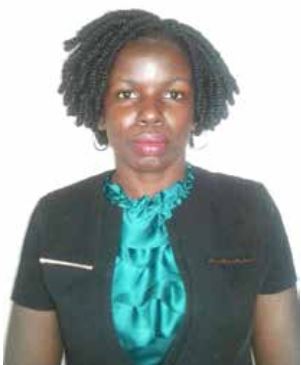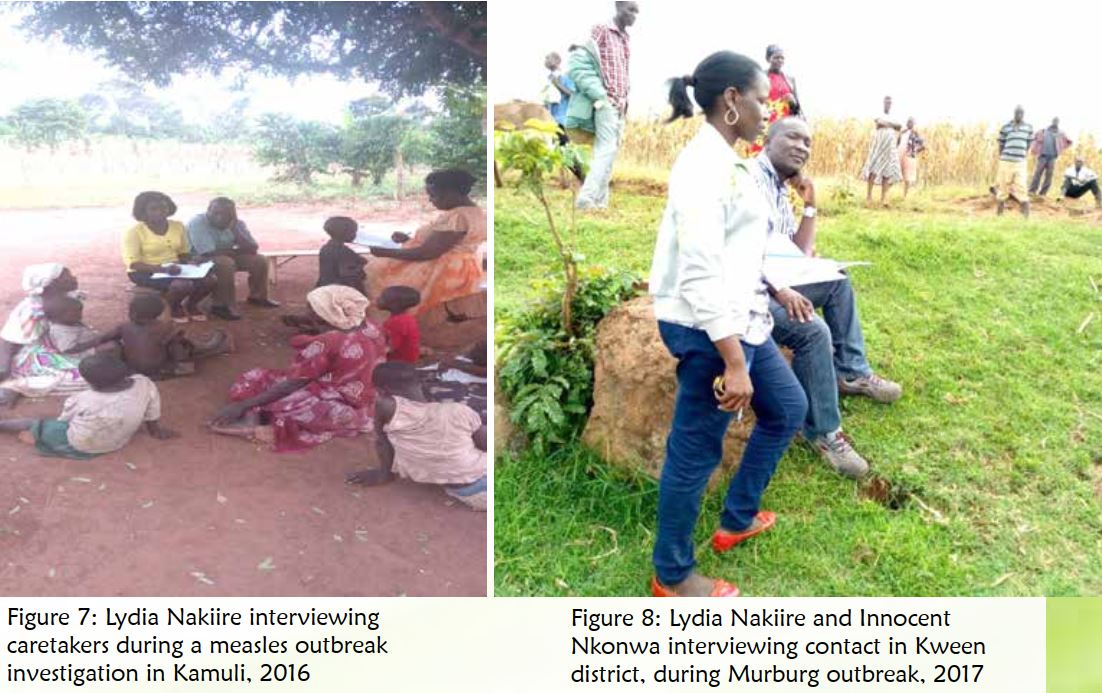 |
Lydia Nakiire
|
ABOUT THE FELLOWLydia Nakiire holds a master’s degree in Public Health and Bachelor of Biomedical Laboratory Technology from Makerere University, Uganda. Lydia started her career as a Laboratory Technologist at the Joint Clinical Research Centre and also worked in other capacities as a deputy head of immunology laboratory and a laboratory mentor. As a laboratory technologist she worked at Pfizer Malaria Research Project (Protocol A0661134) and other projects in collaboration with MRC-UK clinical trials unit. Lydia mentored Nsambya hospital laboratory personnel under the JCRC-THALAS project in collaboration with MOH-SUSTAIN project. She saw the laboratory performance improve steadily from star one to star three of WHO SLIPTA program in two years. Lydia joined the PHFP in 2016 and was attached to the Uganda Ministry of Health (MOH)-Public Health Emergency Operation Centre (PHEOC). The Public Health Emergency Operation Centre is among the Global Health Security Agenda (GSHA) pilot demo projects implemented in March-September 2013. The PHEOC was set up to enhance the countries capacity to detect, prevent and coordinate response to disease outbreaks, natural disasters, bioterrorism and other public health emergencies. Achievements at the host site
Program-specific achievementsSurveillance and Evaluation
Quality improvement project
Outbreak investigations
HIV Projects
Communication: Presentations and Publications
Manuscripts:
Leadership and management:
Summary of Epidemiologic Study:Title: HIV couple counseling and associated factors among HIV infected patients in the Lake Kyoga fishing community Introduction: Couple HIV Counseling and Testing (CHCT) is a key intervention in the prevention of heterosexual HIV transmission and achievement of the 90-90-90 UNAIDS targets for reducing HIV by 2020. This study assessed utilization of CHCT and associated factors among HIV-infected residents of Kyoga fishing community, a lakeside community of persons considered high-risk for HIV infection. Methods: We conducted secondary data analysis of the Makerere University School of Public Health HIV behavioural survey data collected in 2013 among residents of the Lake Kyoga fishing community. We used logistic regression to identify factors independently associated with utilization of CHCT. Results: The analysis included 118 records.The mean age of participants was 38 (SD: 8.7) years; 61 (53%) were women, 98 (78%) attained primary education, and 63 (53%) were in monogamous marriages. Among 118 persons surveyed, 57 (48%) had ever utilized CHCT. Previous discussion of individual HIV results with partner [adjusted odds ratio (aOR) =12; 95% CI: (3.1-46)] and living at a lake landing site (dock where fishing commerce often takes place) for >5 years [aOR=3.8; 95% CI (1.3-12)] increased the odds of ever utilizing CHCT. Traveling away from the landing site within one month before the survey [aOR=0.31; 95% CI: (0.1-0.93)] reduced the odds of ever utilizing CHCT. Conclusion: Previous discussion of HIV results with a partner and living on the landing site for five or more years increased the odds of utilization of CHCT; recent travel away from the site reduced the odds of CHCT in this Ugandan fishing community. To increase CHCT uptake in this community, we recommended the rollout of interventions that encourage discussion of individual HIV results among couples, and interventions targeting mobile populations who have resided in the area for a shorter time. Lessons Learned
|
|
Sign in
Sign in
Recover your password.
A password will be e-mailed to you.

